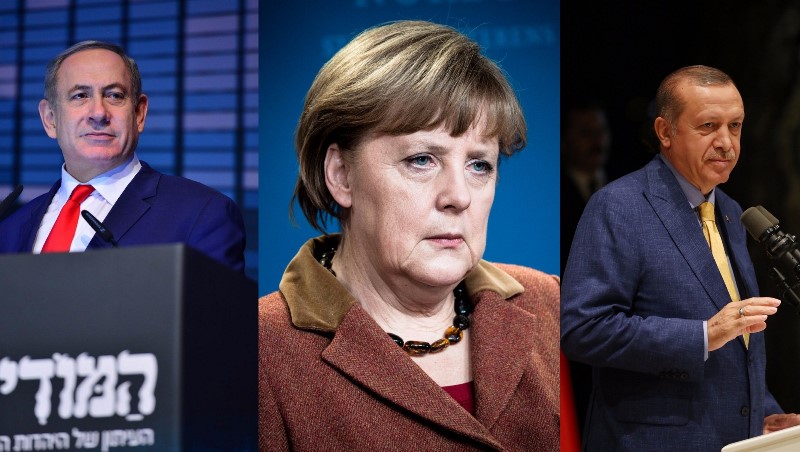
[authorbox authorid=”60″ ]
[dropcap size=small]TTurkey and Israel were once close allies, bonded as two states surrounded by hostile regimes. However, Turkey has stated in recent days that US President Donald Trump’s move to declare Jerusalem the capital of Israel will cross a “red line” and will cause Turkey to sever all ties with the Jewish nation. Germany has also rejected the US move.
Background on Turkish-Israeli Relations
Following the collapse of the Soviet Union in the 1990s, Turkey began to position itself as a key state in the Middle East, one that could act as a “bridge country” between the West and the East. In an attempt to align itself with the West and become closer to securing EU membership, Turkey forged ties with the only other democratic state in the region: Israel.
During this time period Turkey and Israel had similar interests. Both states were surrounded by what they perceived as hostile regimes, as well as a number of organized domestic and external threats, namely the Kurdistan Workers’ Party (PKK) and Hezbollah. A number of military and trade agreements between the two countries punctuated this era as well, including a 1996 free trade agreement, the 1994 Defense Cooperation Agreement, and the 1996 Military Training Cooperation Agreement.
Nevertheless, in the nearly two decades following such agreements, economic, military, and political ties between Turkey and Israel have deteriorated to the point of Turkey now threatening to cut off all ties with its once staunch regional ally. Among the reasons for this deterioration is the rise and reign of President Recep Tayyip Erdogan and his Justice and Development Party (AKP) in Turkey. Under Erdogan, Turkey has embraced its Islamic roots and has in turn forged stronger ties with the Islamic World, as well as has gradually backslid into near authoritarianism, all of which has drawn increased skepticism from Israel.
Additionally, the 2008-9 Gaza War, in which nearly 1500 Palestinians and thirteen Israelis were killed, led Turkey to be outspoken against the disproportionate number of Palestinian deaths, accusing Israel of severe human rights violations. Particularly noteworthy in this exchange was Erdogan’s debate with late Israeli President Shimon Peres at a World Economic Forum summit in Davos, Switzerland, out of which Erdogan stormed after declaring to Peres, “When it comes to killing, you know very well how to kill.”
Trump’s Recognition of Jerusalem as the Capital of Israel
The rift that has been steadily increasing over the past decade, however, seems to have become an insurmountable chasm in the past week, amidst President Trump’s recognition of Jerusalem as the capital of Israel. In response to this announcement from the United States, Turkey declared that such a move would be cross a “red line for Muslims,” and threatened to sever all diplomatic ties with Israel, while Israeli President Benjamin Netanyahu in turn retorted that Jerusalem has always been the capital of Israel, “whether [Turkish President] Erdogan recognizes it as such or not.”
Not only have Turkey and the rest of the Arab World completely rejected the US move, but the European Union as a whole has also voiced its opposition to the decision, choosing to stick with previous UN resolutions which call for the role of Jerusalem to be negotiated as part of a peace process that would result in a two-state solution. Most significant among the countries rejecting this decision is Germany.
Implications of Germany’s Decision on German-Turkish-Israeli Relations
The decision of Germany to side with Turkey and the Arab World in this circumstance is interesting. 2017 has been a strained year in Turkish-German-EU relations, with tensions having arisen over European countries’ opposition to a referendum earlier in the year that resulted in an expansion of Erdogan’s presidential powers, and Turkey’s response likening German Chancellor Angela Merkel and other European leaders to Nazis.
Despite such a clear deterioration in diplomatic relations, Germany still decided to side with Turkey in a move that risks alienating Israel, a country that Germany has long supported in an effort to reconcile its past. This move can be seen as an attempt by Germany to appease its three million Turkish citizens- instead of alienating a significant segment of the population, Germany chose to take the side opposite Israel.
Germany’s decision will be viewed in an unfavorable light by Israel and the Israeli media, which just recently accused German Foreign Minister Sigmar Gabriel of “bullying” the Jewish state. Altogether this will likely weaken the ties between the two countries, especially during a time of severely deteriorated Turkish-Israeli relations, as it now appears that Germany is choosing to align itself with Turkey against Israel. Whether Germany’s position on the issue will result in improved ties with Turkey, on the other hand, is a matter that will remain to be seen.
—————————————————————-
Sources:
Freund, Michael. “Time to Put Germany’s Foreign Minister in His Place.” The Jerusalem
Post, 7 Dec. 2017, www.jpost.com/Opinion/Time-to-put-Germanys-foreign-
minister-in-his-place-517410.
Landau, Noa. “Israel Fires Back at Turkey: Jerusalem Has Been the Jewish Capital for
3,000 Years.” Haaretz.com, 5 Dec. 2017, www.haaretz.com/israel-news/1.826906.




1 Comments
notsofaraway
We are definetely not caught in the middle – strange idea. Germany is a christian country that is not
willing to tolerate maroding turkish bands such as the “Osmanen” – or Mongols, if you want.
It is to our bewilderment that esp. Turks tend to think that we are “friends”.
Turks probably think that because they like Hitler, and in their poor brains are all Germans
Hitler-like, therefore they have been liking us so far, because of certain events in the past.
Unfortunately, Germany turned out to be a christian country that deeply dislikes Turkey as well as Erdogan. No, we did not get caught – we side with Israel and the West, belive us.
Comments are closed.